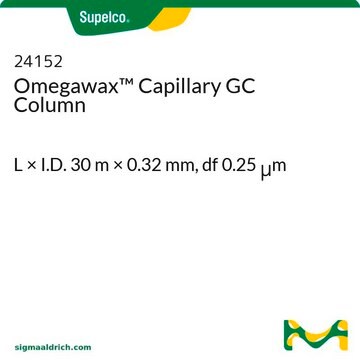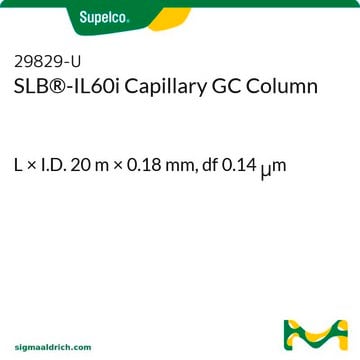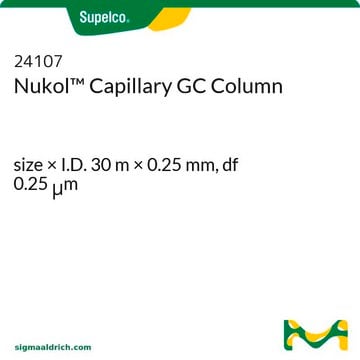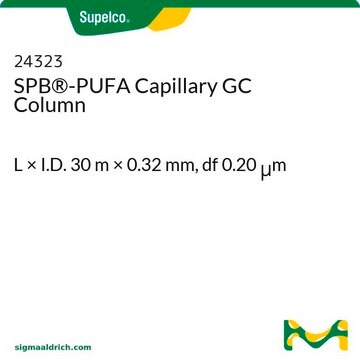23399-U
Columna para GC capilar Omegawax
L × I.D. 15 m × 0.10 mm, df 0.10 μm
Iniciar sesiónpara Ver la Fijación de precios por contrato y de la organización
About This Item
UNSPSC Code:
12352211
eCl@ss:
32119290
NACRES:
SB.54
Productos recomendados
material
fused silica
Quality Level
agency
meets requirements for USP G16
packaging
pkg of 1 ea
parameter
50-280 °C temperature (isothermal or programmed)
Beta value
250
df
0.10 μm
technique(s)
gas chromatography (GC): suitable (fast GC)
L × I.D.
15 m × 0.10 mm
matrix active group
Bonded; poly(ethylene glycol) phase
application(s)
agriculture
biofuels
clinical
food and beverages
column type
capillary polar
¿Está buscando productos similares? Visita Guía de comparación de productos
General description
Application: This column allows highly reproducible analyses of fatty acid methyl esters (FAMEs), specifically the omega 3 and omega 6 fatty acids. It is tested to ensure reproducible FAME equivalent chain length (ECL) values and resolution of key components.
USP Code: This column meets USP G16 requirements.
Phase:
USP Code: This column meets USP G16 requirements.
Phase:
- Bonded
- Poly(ethylene glycol)
- 50 °C to 280 °C (isothermal or programmed)
Application
Omegawax capillary GC column may be used for herbicide determination using In-tube Solid-phase microextraction (SPME).
Other Notes
We offer a variety of chromatography accessories including analytical syringes
Legal Information
Elija entre una de las versiones más recientes:
¿Ya tiene este producto?
Encuentre la documentación para los productos que ha comprado recientemente en la Biblioteca de documentos.
Comparison of two gas-liquid chromatograph columns for the analysis of fatty acids in ruminant meat.
Susana P Alves et al.
Journal of chromatography. A, 1216(26), 5130-5139 (2009-05-19)
Two gas-liquid chromatograph capillary columns for the analysis of fatty acids (FA) in ruminant fat are compared. Those columns are the CP-Sil 88 of 100 m long with a highly polar stationary phase and the Omegawax 250 of 30 m
L J Krutz et al.
Journal of chromatography. A, 999(1-2), 103-121 (2003-07-30)
Liquid-liquid extraction or solid-phase extraction followed by gas chromatography (GC) or high-performance liquid chromatography are traditional herbicide residue determination methods for environmental samples. Solid-phase microextraction (SPME) is a solventless, fast, and sensitive alternative herbicide residue extraction method that can be
H Kataoka et al.
Analytical chemistry, 71(19), 4237-4244 (1999-10-12)
The technique of automated in-tube solid-phase microextraction (SPME) coupled with liquid chromatography/electrospray ionization mass spectrometry (LC/ESI-MS) was evaluated for the determination of beta-blockers in urine and serum samples. In-tube SPME is an extraction technique for organic compounds in aqueous samples
M Vecka et al.
Journal of chromatography. B, Analytical technologies in the biomedical and life sciences, 770(1-2), 91-99 (2002-05-16)
Four capillary columns (A: CP-WAX 52 CB 25 m x 0.25 mm; B: CP WAX 52 CB 30 m x 0.25 mm; C: CP-WAX 58 CB 25 m x 0.25 mm, Chrompack; D: OMEGAWAX 320 30 m x 0.32 mm
H Kataoka et al.
Journal of chromatography. B, Biomedical sciences and applications, 731(2), 353-359 (1999-10-08)
The technique of automated in-tube solid-phase microextraction (SPME) coupled with liquid chromatography-electrospray ionization mass spectrometry (LC-ESI-MS) was evaluated for the determination of ranitidine. In-tube SPME is an extraction technique for organic compounds in aqueous samples, in which analytes are extracted
Nuestro equipo de científicos tiene experiencia en todas las áreas de investigación: Ciencias de la vida, Ciencia de los materiales, Síntesis química, Cromatografía, Analítica y muchas otras.
Póngase en contacto con el Servicio técnico






